By Isqil Najim
It's a common refrain in Nigeria: "Our leaders are the problem." While leadership at the highest levels certainly plays a crucial role, this simplistic view obscures a more complex reality: leadership is a system, not a single individual, and we all play a part.
Focusing solely on those in power in Abuja ignores the interconnected network of human actions that contribute to the nation's challenges.
One flawed argument is that replacing current leaders with alternatives will magically solve everything. The irony is that the people we lined up as alternatives are 99..9% the same as those we wish to replaced.
We simply have a system of swapping individuals, by alternating the options between parties, religions tribal or regional sentiment. All these without focusing on how they will address the systemic issues that will bring about meaningful change.
Critics also overlooks the fact that popular support for certain politicians, regardless of what they says often stems from dissatisfaction with the alternate options. Some times, what we call chosing the lesser evil. All these implies that we still have to face the issue regardless of who won an election.
The problem runs deeper than individual politicians. Many who vehemently criticize "the leaders" contribute to the very problems they decry.
Some elites engage in rhetoric that damages the country's image, prioritizing political advantage over national interest. They support policies that undermine the nation's progress, hoping to capitalize on the resulting failures.
They have developed the "I told you so" mentality which is basically to gaslight those who did not support their political choices.
To them, this is politics.. they didn't see their own "leadership" roles in demarketing of the country, or in the making of lawless, angry generations.
Furthermore, many of us often fail to recognize their own leadership roles within our families and communities.
We may overlook the impact of our words and actions on shaping the next generation of leaders. By fostering unpatriotic, greedy, or morally corrupt attitudes in our children, we inadvertently contribute to the very leadership failures we lament. We groom future leaders who perpetuate the same destructive patterns. A doom loop.
True leadership is not confined to Aso Rock or election day. It's a system of interconnected networks involving millions of individuals. Consider the following:
From police officers accepting bribes to civil servants engaging in corruption, these individuals are not solely products of Aso Rock. They are members of our communities, shaped by the values they learned at home and in society. No politician can successfully engage in large-scale corruption without the complicity of civil servants.
Parents, elders, and community figures are the first and most influential leaders in a child's life. The values they instill, the examples they set, and the messages they convey shape the character and worldview of future generations.
Parents who prioritize material wealth over integrity, who complain endlessly about economic hardship without fostering resilience on their children or equip them with life saving skills, or who blame external forces for their children's lack of initiative are contributing to a culture of entitlement and dependency. You have collectively corrupted the future leaders. Your products may become tools in hands of other children for all sorts of antisocial behaviours.
It's easy to blame politicians, or President, but the reality is that leadership involves hundreds of national assembly members, state governors and their commissioners, local government chairmen, civil service heads and sub-heads, military, paramilitary and police commanders, business leaders, traditional rulers, judges, lawyers, community heads and millions of family heads. These individuals, all products of Nigerian society, collectively shape the nation's destiny.
Nigerian leaders, those with higher responsibilities to govern, are still Nigerians, made in Nigeria by Nigerians and for Nigerians. They inherit existing problems and operate within a system shaped by the actions of countless individuals.
While they are accountable for their decisions and actions, they cannot single-handedly fix deep-rooted societal issues. They work with the same Nigerians who make up the civil service, police force, contractors, and other institutions. They are subject to the same systemic challenges and limitations.
The point is not to absolve political leaders of their responsibilities but to recognize that true change requires a collective effort.
We must interrogate the mentality that allows individuals to profit from corruption while shifting blame onto others. We must examine our tendency to elevate the evil ones among us to hero's status just because they join in raising the decibels of discontent and magnify the voices reasons. A thief that joins the mob to lynch an armed robber is still a thief.
If we want to fix Nigeria, we must start at home, in our families and communities.
We must ask ourselves: What kind of children are we raising? What values are we instilling in them? What examples are we setting?
The impacts of our actions and inaction toward them won't manifest now until those children get the chance to take higher responsibilities and unleash their bottled inner power on the society.
Leaders are not created on election day or in boardroom or in classroom. They are shaped over a lifetime, starting within the family. If we fail as parents, neighbors, and community members, we are failing the country and jeopardizing the future of our children.
A better Nigeria requires us to groom our children properly, to instill in them the values of integrity, responsibility, and patriotism. It is from this foundation that true and lasting leadership will emerge and spread across all spheres of national life.
I am @Isqilnajim


.jpeg)


0 Comments